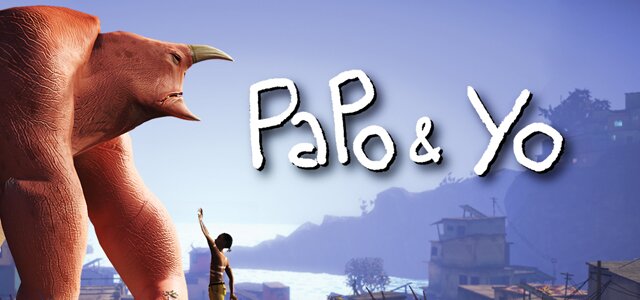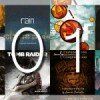 Whereas most video game soundtracks nowadays begin with the predictable orchestral introduction, replete with a full set of string instruments and sometimes a choir, Papo & Yo, composed by La Hacienda Creative’s Brian D’Oliveira, separates itself immediately from the first song onward. Instead of the booming orchestra tied to some introductory movie, the soundtrack opens with “A Strange New World,” (available for a free listen here) composed mostly of drums and flute work. Frankly, you won’t find anything typical on this album, which has a distinctly South American feel and style that sounds authentic in execution.
Whereas most video game soundtracks nowadays begin with the predictable orchestral introduction, replete with a full set of string instruments and sometimes a choir, Papo & Yo, composed by La Hacienda Creative’s Brian D’Oliveira, separates itself immediately from the first song onward. Instead of the booming orchestra tied to some introductory movie, the soundtrack opens with “A Strange New World,” (available for a free listen here) composed mostly of drums and flute work. Frankly, you won’t find anything typical on this album, which has a distinctly South American feel and style that sounds authentic in execution.
In a pleasurably surprising twist, you could actually dance to the majority of the soundtrack, but this isn’t club music. Unlike the four-on-the-floor beat of electronica, the songs here are reminiscent of salsa and samba dancing, which is arguably more colorful and delightful to hear at length. This is immediately evident in the aforementioned track and the two tracks, “The Lost Song” and “Lost Hope,” which lure the listener into the fantasy setting. Despite the catchy rhythms of the varied percussion, though, the music surrounding the drums evokes the emotions of the game from curiosity to mourning through varied use of acoustic guitars and a variety of flutes. It is an emotional dance that ends with introspection, conveyed through tracks like “A New Hope,” which sounds like the South American version of a waltz with an apparent rise and fall to its melody.
The game, Papo & Yo, developed by Minority Media, is about a boy with an abusive alcoholic for a father who is whisked away to a favela filled with secrets. The buildings feature interactive line drawings, which Quico uses to make them walk around or stack them on top of each other. Eventually, he comes across Monster, whose size becomes necessary to traverse the platforms, but when Monster consumes a frog, he becomes consumed by fire and tries to kill Quico until he can be quelled. Monster is clearly the representation of Quico’s father, a metaphor the creator, Vander Caballero, made perfectly clear before its release.
The wonder of the favela and the drama caused by Monster is convincingly portrayed through the songs provided on the soundtrack. However, the challenge in translating it to a commercial release began with the fact that the music in the game is mostly procedural; this means that songs don’t have a set length or repetition cycle, and the music builds as certain milestones are completed on each level. Thus, putting it into this format requires D’Oliveira to take his loops and refine them into appropriately sized compositions which build upon themselves without overstaying their welcome. He is successful, though given how fantastic some pieces can be, I am not sure why the short ditties, “Here I Am” and “Goodbye Alejandra,” were included. They do not have enough length to become more than simple instrumentals and are both too early in the album to be palette cleansers.
It is tough to play favorites with the Papo & Yo soundtrack because the whole thing is refreshing compared to the soundtracks that accompany typical AAA titles. You have never heard anything like this for a video game. Ultimately, though, I gravitated towards songs tied to the more emotional moments in the game. Songs like “Over the Inferno” and “Anger Management,” which back haunting scenarios between Monster and Quico, stick with me due to their effective use of drum work and the introduction of dramatic and tense string work. However, in contrast to varied string orchestral arrangement I’m accustomed to, the strings used here usually all play the same melody together, merely adding a layer upon the other instruments instead of stealing the show from the more culturally separated elements.
The star track may be “Liberation (La Muerte de Papo),” the memorable song from the credits, which follow the emotional ending to the game. On top of conveying just the right level of mournfulness and introspection, it is the first song to feature vocals. Written in the game’s language, the lyrics are sung by a choir of children who, if you’ve played the game, will break your heart. Papo & Yo deals with the themes of lost innocence and forced maturation, so to finish with a song sung by innocents is both appropriate and jarring. Like the strings, the children all sing the same tune as one instrument rather than be composed of varying tenors and sopranos and the like, and the effect is gripping.
I’ve listened to the soundtrack a few times now, and while I do not recognize any overarching themes repeated throughout the album, there are two pairs of songs featuring similar melodies. “Cozy Digs” acts as a precursor to the beautiful “Liberation (La Muerte de Papo),” carrying the same melody over a more ambient background track. I immediately recognized the melody the first time I listened to the song and was surprised I didn’t notice it during my second playthrough of the game. “Over the Inferno” and “A Slow Realization” also share a common melody, but the former has more urgency to its composition, and the latter is a more simplified, slower piece, which is also sadder.
It is hard not to recommend this soundtrack. Aside from being a brilliant accompaniment to the game, it is a breath of fresh air to listen to uniquely South American rhythms and instruments in a genre filled with booming orchestras. I love the emotional dance Brian D’Oliveira has created for the listener, and much of it contains universal appeal, thus not requiring one to play the game. If anything, it can only drive interest. This album proves that 2012 is not over yet, and this runs neck and neck with the Grammy-nominated soundtrack to Journey in its ability to separate itself from the chaff. It is undeniably a soundtrack of the year contender, and I’m thankful to have it in my library.
The Papo & Yo soundtrack is available exclusively on the Playstation Network.




Pingback: Papo & Yo press round-up - January 2013 | Minority()